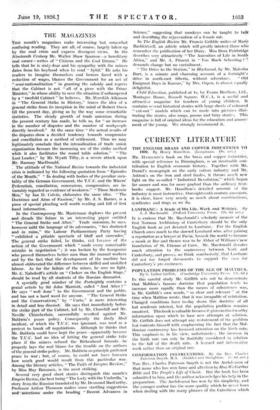THE MAGAZINES
Tars month's magazines make interesting but somewhat confusing reading. They are all, of course, largely taken up by the coal crisis and express divergent views. In the Nineteenth Century Mr. Walter Shaw Sparrow—a hereditary coal owner—writes of " Citizens and the Coal Drama." He tells that he is sixty-four and his sympathy with the miners dates from his boyhood when he read " Sybil." He asks his readers to imagine themselves coal hewers faced with a ;eduction of wages, blames the Government for an act of semi-nationalization " in granting the subsidy and regrets that the Cabinet is not " all of a piece with the Prime Minister,"- in whose ability to save the situation if unhampered by a " twofold Cabinet " he believes. Mr. Meredith Atkinson in " The General Strike in History," traces the idea of a general strike from its inception in the mind of Robert Owen till the present day, giving us by the way some remarkable Statistics. The steady growth of trade unionism during the present century has made, he tells us, for " an increase in the number of disputes and the number of workpcople directly involved." At the same time " the actual results of the disputes show a decided tendency towards compromise and conciliation as a method of settlement. Thus we may legitimately conclude that the intensification of trade union organization favours the increasing use of the strike method while it also facilitates the round table solution." " The Lost Leader," by Mr. Wyatt Tilby, is a severe attack upon
Mr. Ramsay MacDonald. i- • .. The attitude of the National Review towards the industrial
crisis is indicated by the following quotation from " Episodes of the Month." " In dealing with bodies of the peculiar men- tality of the Getman Government, the T.U.C. and the Miners' Federation, conciliation; concessions, comprothiies, arc in- variably regarded as evidenee'of V(eaknesi.". " Those Moderate Men," by Ian D. Golvin; elaborates the Sinie- idea. ":" The Doctrines and Aims of -Fascism,"- by- Mr. J. S. Barnes, is a piece of special pleading well worth reading and full of first hand information.
In the Contemporary Mr. Masterman deplores the present and :dreads the future in an interesting "paper entitled " Thee General Strike and After." Trade unionism, he says, however mild the language of its adversaries, " lies shattered and - in ruins," the Labour Parliatheritary Party -having " exhibited a pitiable spectacle of bluff and surrender." The general strike failed, he thinks, r:c.t Lecame of the action. of the GoVernment- which " made: every conceivable mistake in neirotiation " it was broken by the bourgeoisie who proved themselves better- men than the manual workers and by the fact that the development of the machine has almoit obliterated-the difference between skilled and unskilled labour. As for the- faihrie of 'the mines, he sees no light. Mr.: C- Nabokars. article on " ChekoV on the English Stage," should be- lead by all students of the Russian dramatist. A specially good niimber of the Fortnightly contains a genial article by Sit John Marriott, called " And After ? " He says " well done'?' to the Government and the public, and has not a hard word for anyone. " The General Strike and the ConservativeS," by " Curio," is more interesting in detail and leSs discreet: He says that immediately before the strike dart 'Of the Cabinet, led by Mr. Churchill and Mr. Neville ghnmberlain, successfully revolted against Mr. Bald' in's peace policy. Consequently the Daily Mail incident, of which the T.U.C. was ignorant, was used as a pretext to break off negotiations. Although he thinks that Mr. Baldwin could have kept the peace—apparently because the T.U.C. had no idea of letting the general strike take place if the miners refused the Birkenhead formula—he properly lays the real-blame for the trouble on the authors of the general strike policy. Mr. Baldwin on principle preferred peace to war ; but, of course, he could not have foreseen how much good would result from this particular war. Among the literary articles, " The Faith of Jacques Reviere," by Miss May Bateman, is the most striking.
Several very good short stories distinguish this month's EmpireReview, the best being "The Lady with the Umbrella," a story from the Russian translated by Mr. Desmond MacCarthy. Professor Arthur Thomson makes some startling suggestions andansertions^ under the heading " Recent Advances in Science," suggesting that monkeys can be taught to talk and describing the rejuvenation of a female rat.
In The. English Review Mr. Francis Gribble. writes of Marie Bashkirtseff, an article which will greatly interest those whir remember the publication of her Diary. Miss Dora Fairbridke describes very attractively " The Amenities of Life in South Africa," and Mr. A. Pinsent in Too Much Schooling ? demands change but no curtailment.
" The Drive to the Station," in Blackwood, by Mr. Malcolm Burr, is a minute and .charming account of a fortnight's
drive in north-east Siberia, without adventure. " Old Emigrant Days in Kansas," by Mrs. Omen, is almost equally delightful.
Child Education, published at Is. by Evans Brothers, Ltd.. Montague House, Russell Square, W.C. 1, is a useful and attractive magazine for teachers of young children. It contains several historical stories with large sheets of coloured " cut-out " models which can be made into pictures illus- trating the stories, also songs, poems and fairy stories. This magazine is full of original ideas for the education and amuse; ment of the young. We strongly recommend it.










































 Previous page
Previous page